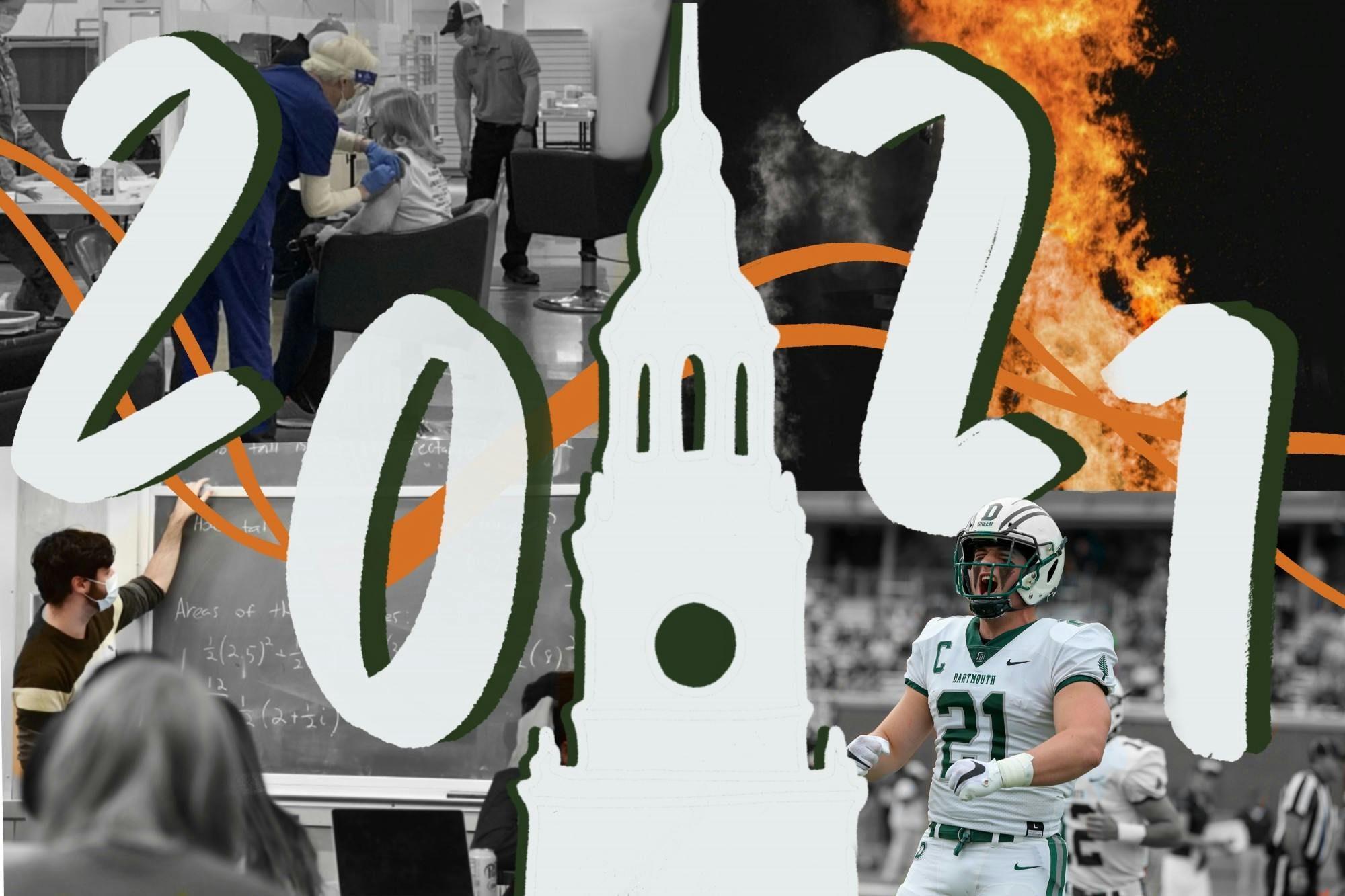In many cases, what 2020 took away, 2021 brought back — chaotically. As Dartmouth and the nation slowly emerge from the COVID-19 pandemic under the protection of increasingly widespread vaccines, the community has grappled with the long-term impacts of the “return to normalcy,” from a housing and labor crunch to a new awareness of mental health on campus. Here’s a look back at the stories that shaped the year.
January
Student arrival on campus for the winter term was delayed by nearly two weeks due to a surge of cases in the Upper Valley and nationwide. Students faced travel problems caused by the last-minute change, and delays in pre-arrival and on-campus testing led to longer quarantines than expected.
The country was no less unsettled; the Jan. 6 insurrection in Washington, D.C. — an attempt to overturn the election of now-President Joe Biden — drew condemnation from all corners of Dartmouth’s campus, including College President Phil Hanlon. New Hampshire Rep. Annie Kuster, a Democrat, told The Dartmouth about the terror inside the House of Representatives, and the Rockefeller Center for Public Policy held a panel on the “fragile state” of American institutions.
As students finally returned to campus and arrival quarantine ended, much of the term’s operations began in earnest. Senior societies and Greek houses held largely virtual tapping and rush proceedings; the latter saw over 600 bids extended. The dining halls opened for takeout and eventually for dine-in service, the Dartmouth Outing Club launched winter subclub trips and the College started up what it deemed a “winter wonderland” of outdoor programming. Students expressed concerns about isolation and living conditions for students in interim housing and in quarantine, and the College pledged increased mental health resources.
February
In February, the vaccine rollout reached Dartmouth as Geisel School of Medicine and undergraduate first responders got the jab. Inoculations — supported, in the case of the Pfizer-BioNTech vaccine, by Geisel research — also brought relief to Hanover nursing and retirement homes, some of which had seen residents die from COVID-19 during the winter.
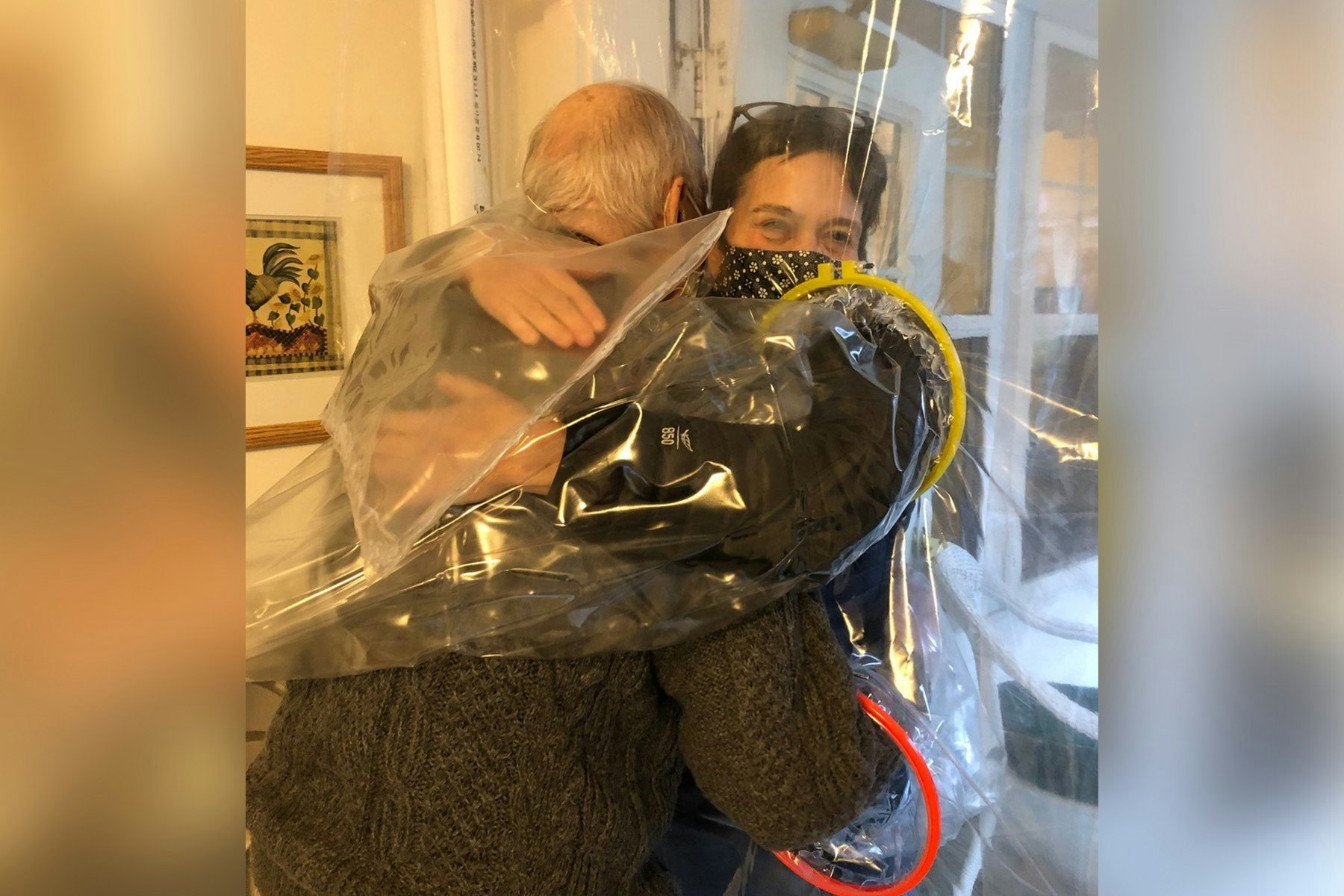
At Wheelock Terrace, a visitor greets an elderly resident through the facility’s “hug wall.”
In a major development in sports, Dartmouth reinstated the five teams cut in summer 2020. Multiple athletes had alleged in a lawsuit that the College’s decision to cut the teams violated Title IX regulations, and the College cited Title IX compliance concerns in its decision to bring the teams back. As teams scrambled to resume practices and bring back coaches, frustrated student-athletes lashed out at athletic director Harry Sheehy on an “explosive” Zoom call. The College announced Sheehy’s retirement a week later.
Controversy hit academics as well: Citing budget issues, the College announced that study abroad programs would be significantly scaled back — first reported by The Dartmouth — and that two libraries, Kresge and Paddock, would be closed indefinitely. Students and faculty rallied around both causes, and while the libraries remain closed, the study abroad budget cuts were reversed in May.
Additionally, following revelations in January of former trustee and major donor Leon Black ’73’s ties to convicted sex offender Jeffrey Epstein, students and alumni called on Dartmouth to change the name of the Black Family Visual Arts Center, which was built after a $48 million donation from Black.
March
At the tail end of winter term, cases spiked dramatically in Dartmouth’s largest COVID-19 outbreak yet. The College closed indoor facilities on Feb. 25, when the case count neared 40 active student cases, and reverted to strict arrival quarantine procedures for all students two days later when active student cases exceeded 100. The outbreak peaked on March 4 at 143 active student cases, 130 students in quarantine and 162 in isolation. By March 8, as cases began to fall, quarantine restrictions were lifted.
The outbreak left student workers without pay, raised additional concerns about conditions in isolation and quarantine, prompted several Hanover businesses to restrict in-person operations, left Dartmouth staff scared of exposure when working with students and caused over 200 students to leave campus early rather than remain under restrictions until spring break. Student pleas to adjust grading policies, given the number of individuals impacted by the outbreak, were rejected by the College.
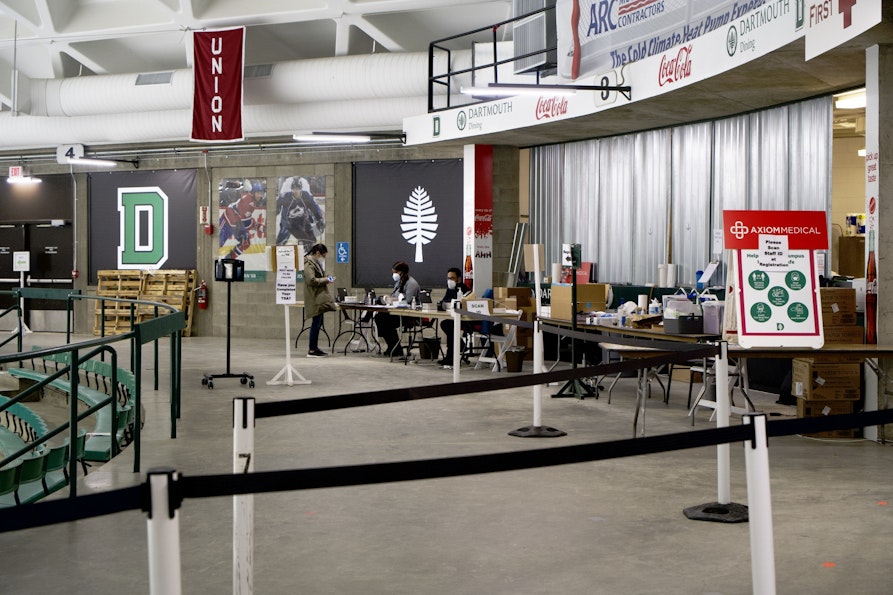
COVID-19 testing took place in Thompson Arena for much of winter 2021.
Even as the winter term ended with gradually declining cases on campus and increasing vaccinations, tragedy struck on March 14 when Connor Tiffany ’24 died by suicide at 19 in Boston. He was remembered as kind, compassionate, warm and motivated. Tiffany was the second first-year student to die by suicide during the academic year; the first, Beau DuBray ’24, died in November 2020 at 18.
April
As winter gave way to spring, the word on everyone’s minds was “vaccines.” Despite the outbreak and a College partnership with the state to vaccinate eligible students and staff, when New Hampshire announced that everyone 16 and older would be eligible for vaccination starting April 2, Gov. Chris Sununu, a Republican, excluded out-of-state college students. The town of Hanover, students, and The Dartmouth Editorial Board condemned the governor’s decision as detrimental to public health. Creative students found other ways to get their shots, discovering that enforcement of the ban was inconsistent at best across various vaccination sites. Access for out-of-state students was eventually opened on April 19, soon after Dartmouth announced that it would require full vaccination for students come fall.
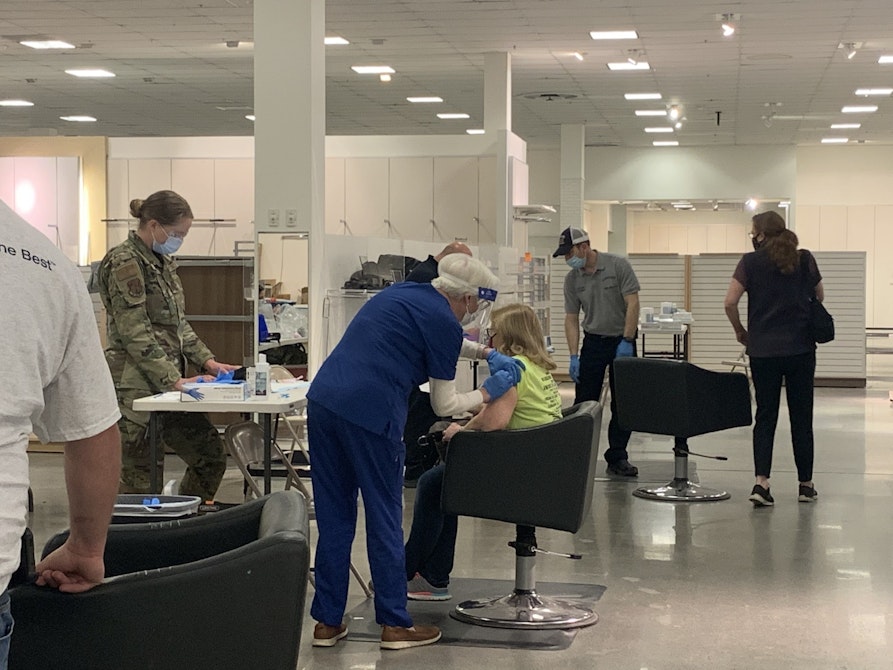
Many Dartmouth students, faculty and staff members were vaccinated at state-run vaccination sites like this one in West Lebanon.
In additional signs of the slow but sure progress in the battle against COVID-19, varsity sports resumed competition after over 400 days and New Hampshire allowed its statewide mask mandate to expire — though Hanover and the College kept theirs in place until after Commencement in June.
In non-pandemic news, the annual Student Assembly elections saw the campaign of Attiya Khan ’22 and Sebastian Muñoz-McDonald ’23 suspended for allegedly spreading misinformation; the candidates panned a lack of due process. After a lively virtual debate hosted by The Dartmouth, Jennifer Qian ’22 and Maggie Johnston ’22 were elected SA president and vice president, respectively. Additionally, Dartmouth extended offers of admission to 1,749 students for the Class of 2025 as its acceptance rate plunged to a record-low 6.17%. And Provost Joseph Helble announced that he would resign in June to become the president of his alma mater, Lehigh University.
Tragically, April also saw another undergraduate student death: that of Lamees Kareem ’22. Kareem died at 20 of a medical condition unrelated to COVID-19 for which she had been hospitalized for several weeks. A government and economics major, cartoonist for The Dartmouth and the College’s first undergraduate student from Saudi Arabia, she was remembered as “a strong, compassionate friend.”
May
May saw multiple high-profile controversies roil Dartmouth. The Geisel School of Medicine made national headlines for a cheating investigation that implicated at least 17 students and, according to The Dartmouth’s investigation, pushed multiple through a judicial system lacking in due process. Ultimately, the students involved saw their charges dropped and won an apology from Geisel Dean Duane Compton in June.
Commencement, too, saw controversy, as the College announced a sudden reversal of its February decision to bar graduating students from bringing guests; a revised plan allowed two guests per student. Seniors hailed the decision but noted that its timing, just a month before the ceremony, left little time for relatives to make travel plans.
Additionally, an external investigation cleared a computer science professor of sexual misconduct and retaliation allegations levied against him by former computer science Ph.D. student Maha Hasan Alshawi. A subsequent report also found “insufficient information” for retaliation and discrimination allegations Alshawi made against eight other faculty and staff, seemingly bringing an end to a saga that captivated the Dartmouth community during the summer of 2020.
It was also in May that Elizabeth Reimer ’24 died by suicide at 18 — the third first-year student to die by suicide in one year and the fourth total student death. The announcement on May 20 sparked an outpouring of grief on campus, including a spontaneous student-organized vigil and a request from Student Assembly for a day of canceled classes for mourning. Even as the College announced limited additional mental health support for students, it rejected the SA proposal, which was followed by a condemnation from The Dartmouth Editorial Board and multiple incidents of graffiti on administration buildings. Over 1,000 students attended a College-organized vigil on the Green, the largest in-person gathering since the pandemic began. Reimer was remembered for her “spontaneous, hilarious and fun-loving nature.”
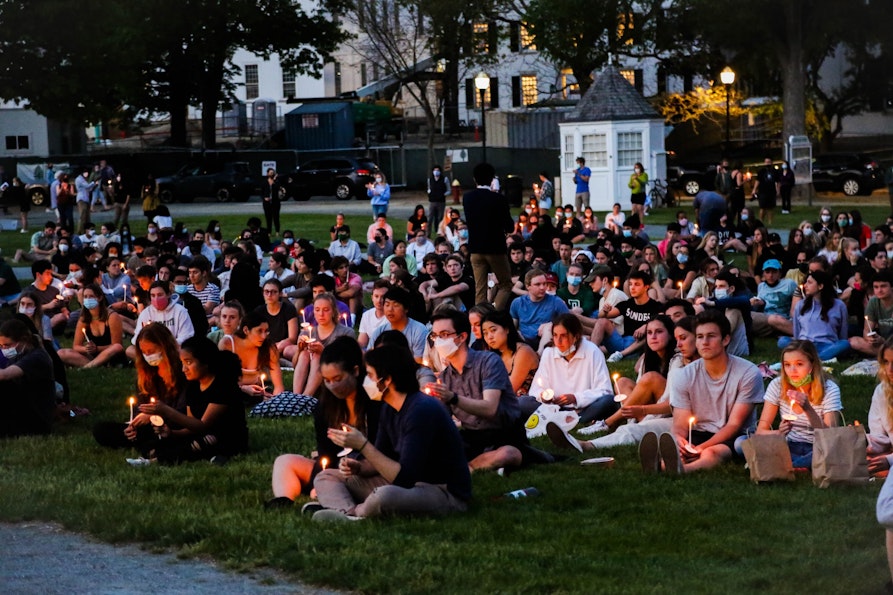
Students held candles during the candlelight vigil, “Dartmouth Remembers.”
But despite being one of Dartmouth’s darkest months in recent memory, May saw positive developments on the COVID-19 front as New Hampshire’s vaccination campaign led the nation and Dartmouth did its part with an on-campus clinic that delivered 570 doses. Despite grappling with a regional labor shortage, Hanover businesses began returning to normal operations, and a new sports bar, Dunk’s, proved to be a hit among students. And the Dartmouth community rallied around international causes, including organizing aid for a COVID-19-stricken India and reacting to another outbreak of violence between Israel and Palestine. But the end of the term mostly brought relief for an unsettled and frustrated campus population.
June
Over 2,000 graduates braved hot temperatures for commencement, held on Memorial Field rather than the Green for social distancing reasons. Pulitzer Prize-winning historian, Harvard University law professor and former Trustee Annette Gordon-Reed ’81 delivered the commencement address at the ceremony. Responding to The Dartmouth’s annual senior survey, members of the Class of 2021 expressed deep dissatisfaction with administration officials and their handling of the pandemic and mental health.

June also saw increased student frustration with Dartmouth’s housing. Students seeking to live on campus during the summer were told not to expect air conditioning in any buildings, even those equipped with it. For the fall, which would see a return to full occupancy and in-person operations, hundreds more students than could fit on campus applied for housing, leading the College to offer $5,000 checks to those willing to give up their on-campus beds in a lottery. Meanwhile, the number of students living locally off campus tripled during the pandemic, straining the Upper Valley housing stock. The Dartmouth Summer Editorial Board called for the College and Hanover to prioritize building more and newer housing — beyond a previously announced “infrastructure renewal fund” that would draw on the endowment to begin upgrades.
July
Some housing issues were alleviated in July, when the College suddenly reversed its air conditioning decision. The $5,000 lottery was successful in encouraging some students to change their plans, but 128 students remained on the fall housing waiting list at the beginning of July.
The public health situation, meanwhile, continued to improve. Mask mandates were lifted across the College and Hanover, case counts dropped so low that Dick’s House became more preoccupied with colds than COVID-19, Dartmouth announced a vaccine mandate for faculty and staff, the Nugget Theaters reopened, and Greek houses earned back their place of assembly permits suspended at the beginning of the pandemic. The return of permitted social events sparked renewed discussions about old problems: Sororities issued sets of rules for events held with fraternities intended to deter sexual misconduct and the Office of Greek Life shuttered the annual Masters pong tournament due to concerns about hazing.
A study by Dartmouth professors showed that student mental health declined with the onset of the pandemic — and an exclusive investigation by The Dartmouth highlighted major gaps in the College’s mental health infrastructure. And Dean of the College Kathryn Lively resigned on July 1, but her departure was not announced until 19 days later, sowing confusion among students and campus groups dependent on her office. Northern Arizona University dean of students Scott Brown was appointed interim Dean of the College in August.
At the annual Hanover town meeting, divisions between students and permanent residents came to a head. David Millman ’23, an undergraduate student, ran an insurgent campaign for a Selectboard seat, and student-driven petitions aimed to promote more dense housing options for students and abolish the town manager position. However, both Millman and the student-backed measures were defeated at the ballot box on July 13.

Voting at the town meeting took place from 7 a.m. to 7 p.m.
Engineering professor B. Stuart Trembly died at 67 on July 18. He was remembered for his passion and dedication to teaching.
August
The month of August saw the effects of climate change felt in Hanover: Smoke from Western wildfires reached New Hampshire, and Tropical Storm Henri made a rare New England landfall that brought rain and wind to the Upper Valley. An Intergovernmental Panel on Climate Change report outlined the consequences for the Upper Valley of continuing worldwide carbon emissions.
The delta variant of COVID-19 also arrived in force in August, leading the College to reinstate an indoor mask mandate. Professors and students diverged in their assessments of the policy. Just a few miles south of campus, a months-long demonstration fueled by misinformation and fear of government mandates protested Dartmouth-Hitchcock Medical Center’s vaccine mandate for employees.

Wayne Mitchell, right, and another protester, left, stood in the median on Route 120, cheerfully waving a sign and flag at passing cars.
September
The fall term got off to a rocky start when the First-Year Trips program, scheduled to return in full force, was scaled back dramatically at the last minute due to COVID-19 concerns. Despite more local trips, many of which saw students sleeping in dorms, participants gave the program high marks.
Beyond Trips, however, much was back to near-normal in the fall: Dining services and the Hood Museum of Art were almost entirely reopened, clubs and activities returned to in-person operations, varsity athletics saw the first mostly normal season since 2020, the First-Year Student Enrichment Program expanded to roughly a month long and town businesses welcomed the arrival of a full cohort of students.
The newly enrolled Class of 2025 was the largest ever thanks in part to more students than usual admitted to the Class of 2024 taking gap years. The swollen student population on campus, combined with the regional labor shortage, led to new issues: Long lines for testing, the Hinman Mail Center and dining locations persisted throughout the fall. Hanover businesses also struggled to find workers, and campus offices experienced leadership vacuums, including the Office of Greek Life, the Tucker Center for Spiritual Life and the Native American Program.
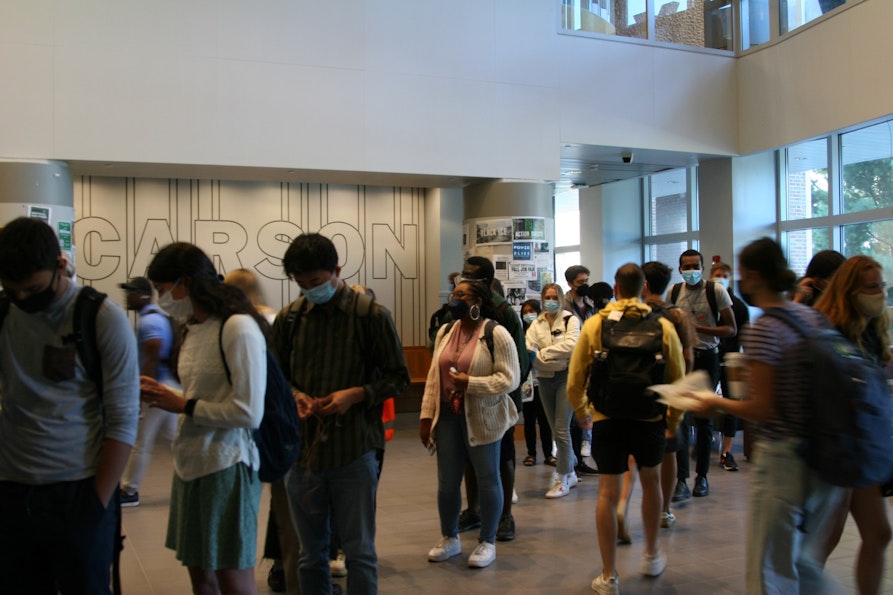
The long DDS lines left some students with no choice but to resort to unhealthy meals or no meal at all.
In addition to labor, housing remained a pertinent issue. Graduate students, most of whom lived off campus, were particularly hard hit, and many were forced to defer enrollment. Additionally, Casque and Gauntlet leased its building to the College for use as graduate student housing. Some undergraduate students who did secure housing were disappointed: residents of La Casa and the Sustainable Living Center reported broken windows, missing showerheads, and other major maintenance issues.
October
Concerns over housing conditions spilled into October, when significant mold growth was discovered in several East Wheelock dorms, prompting student relocations and plans for an overhaul of the buildings.
October also encompassed numerous financial announcements on the part of the College. The endowment posted a whopping 46.5% year-over-year return — prompting a minimum wage increase for students and expanded financial aid — and the Call to Lead capital campaign surpassed $3 billion, supported by a record 103 women alumnae who donated more than $1 million. Dartmouth also formally announced plans to divest its endowment from fossil fuels, capping a yearslong campaign by student and alumni activists.
In pandemic news, Dartmouth rolled out take-home testing first to student-athletes, faculty and staff, and eventually expanded the program to the whole campus population. Booster shots arrived in the Upper Valley in October, and a federal executive order led to Dartmouth expanding its vaccine mandate to all employees, even those not on campus, on Oct. 13. Temporary gym closures in October and November due to, according to the College, noncompliance with masking rules sparked outrage among those looking to work out.
Homecoming, on Oct. 8, saw a return to in-person festivities, an overtime football victory against Yale University and no arrests. Leaf-peeping also drew many non-locals to New Hampshire. On campus, Fraternities, sororities and gender-inclusive houses extended bids to over 650 students in the first in-person rush term since March 2020.

And finally, on Oct. 28, Hanover town manager Julia Griffin announced that she would retire in 2022 after 25 years at the helm of the town. Community members praised her tenure, though some students — with whom Griffin sometimes clashed over pandemic regulations — had more mixed feelings.
November
At the College and in the Upper Valley, the national labor shortage reared its head as students reported long waits for routine appointments at Dick’s House, child care centers in the region struggled to attract workers and a staffing shortage at the Sexual Violence Prevention Project led the College to consider canceling all of the program’s coursework for the Class of 2023.
Other national issues also left their mark on the Upper Valley. DDS was struck by supply shortages, exacerbated by student theft. New developments in the Leon Black case in September led to a November countersuit by Black against a Russian model who accused him of taking her to meet Epstein, and local officials hailed the passage of the $1.2 trillion Infrastructure Investment and Jobs Act, which will funnel billions of dollars to New Hampshire and Vermont for needed improvements.
DDS was not the only campus institution to experience theft. The Dartmouth actually became the news in November when it reported to the Hanover Police that over $200,000 had been allegedly stolen during the tenure of its former office manager.
Fall athletics ended on a high note: After a last-minute field goal against Harvard University and a 31-7 rout of undefeated Princeton University, the Big Green beat Brown University 52-31 and took home a share of the Ivy League championship. The title is Dartmouth’s second consecutive and twentieth all-time. And after a dominant season and an Ivy League championship win, women’s rugby capped off an undefeated campaign with a 28-18 victory against Army West Point in the National Intercollegiate Rugby Association championship. The title represents the team’s second national win in three years.

An overtime win against Yale University during Homecoming Weekend, a narrow win on the road against Harvard University and a blowout win at home over Princeton University helped Dartmouth football win a share of the Ivy League championship.
The fall term closed, however, on a sour note. Active COVID-19 cases spiked just before students left campus, and on Nov. 16, Thayer research engineer John Currier ’79 Th’81 died at 64. He was remembered for his sincerity, compassion and dedication to his work.
December
With nearly all students departing campus for the winterim, December proved mostly uneventful. Dartmouth admitted 560 students, who navigated another mostly virtual cycle, in its early decision round on Dec. 10. A former Dartmouth student and Dartmouth Review editor was charged with criminal mischief, but not a hate crime, for allegedly vandalizing a menorah on the Green in December 2020.
And, bringing things full circle, Dartmouth announced new restrictions for the upcoming winter term on Dec. 17, following the spread of the highly contagious omicron variant. Social gatherings will be limited, dining will be to-go only for two weeks and booster shots will be required. However, citing the mental health and community benefits of in-person interactions and bucking the trend among its Ivy League peers, the College will forge ahead with in-person classes and operations. Only time can tell, then, what 2022 will bring.
Correction appended (9:29 a.m., Jan. 2, 2022): A previous version of this article incorrectly omitted the women’s rugby team’s victory in the National Intercollegiate Rugby Association championship in November. The article has been updated to include the team’s win.


